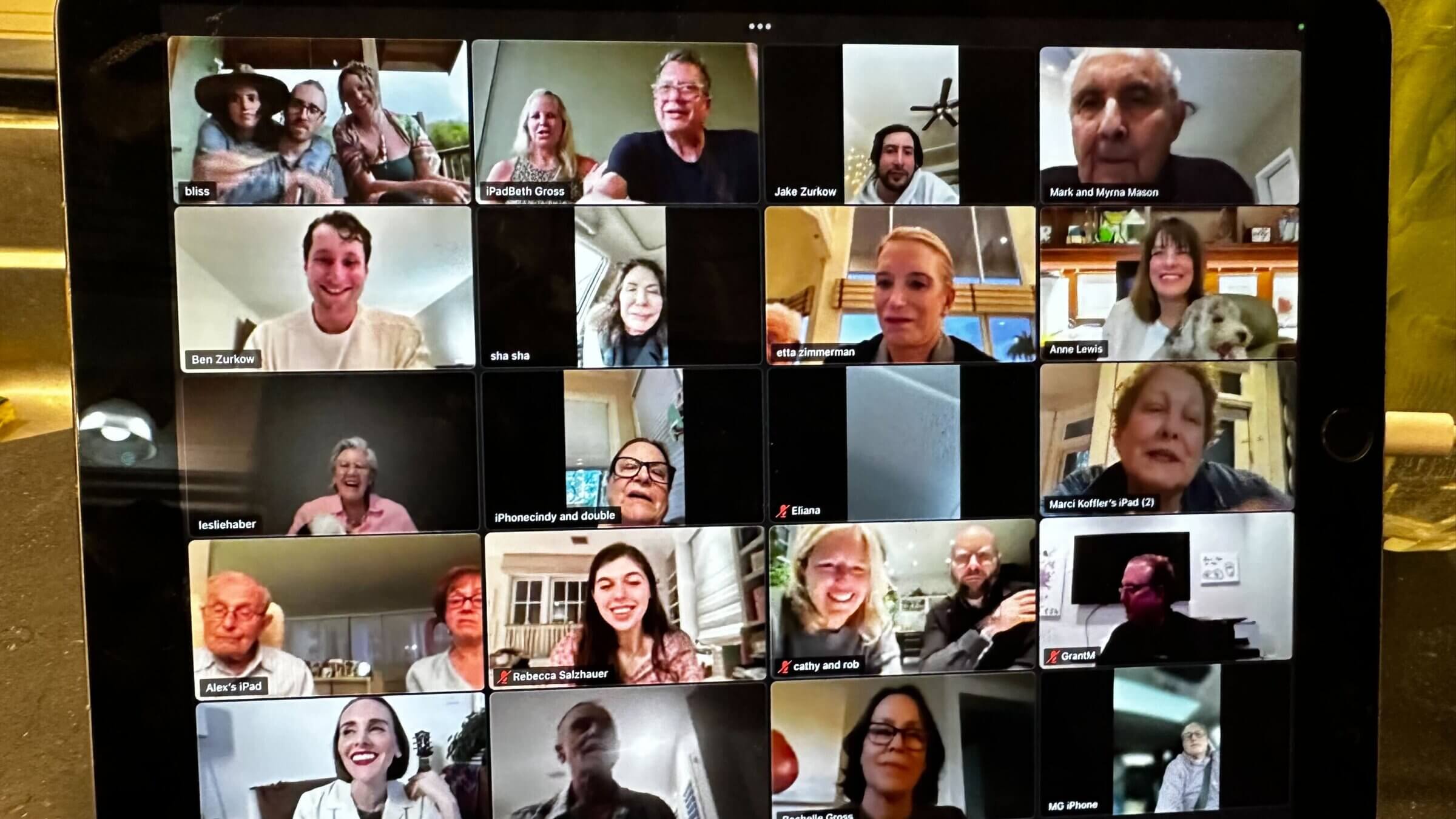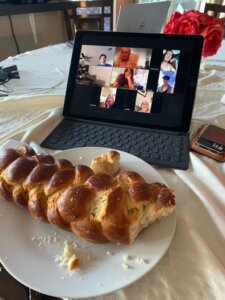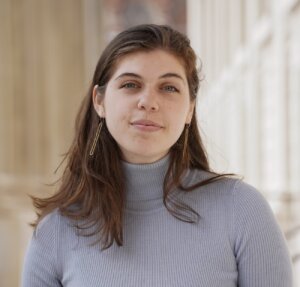This family survived the Holocaust. Could a weekly Shabbat Zoom call help them survive the pandemic?
Three years after the COVID-19 lockdown, more than 50 people in this sprawling family still log on each Friday night to share their love and support

The family’s weekly Shabbat call, which spans three time zones and four generations, is three years strong. Courtesy of Erica Zurkow
The U.S. government ended the COVID-19 public health emergency on May 11. But three years after the pandemic began, one family’s efforts to stay connected with a Shabbat Zoom call is still going strong. Across three time zones and four generations, the weekly ritual has kept them connected through lockdown and the ups and downs of everyday life — and it’s also helped them navigate a tragic loss.
Ben Zurkow, 29, organized their first Shabbat call in the spring of 2020. He’d left his West Village apartment a month into lockdown to quarantine alone at his childhood home in Scarsdale, New York. (His parents were stuck in Colorado on what had been planned as a spring break ski trip.) Zurkow’s roommate joined him in Scarsdale, bringing a sourdough bread starter.

It was a Friday. So Zurkow, a software engineer, tried his hand at a sourdough challah. He FaceTimed his parents and some cousins to show off the finished product. “Of course, it was tiny and awful, and I did it completely wrong,” he said.
But his sourdough challah skills have evolved. So has the family Shabbat video call. Every Friday night since then, Zurkow and his extended family have logged onto Zoom to catch up, make Kiddush and celebrate Shabbat.
The coming together was particularly important in July 2022, when Zurkow’s youngest brother, Henry, died, at age 23, of fentanyl poisoning. The next Shabbat, after going to services, their parents, Erica and Peter Zurkow, logged onto the family Zoom call.
“It was so hard,” Erica Zurkow said. “But there was the family doing the same thing the family does every Friday night, and that was reassuring to all of us.”
“Everybody made sure that they were on the call to give us support and to give each other support, because it’s not like they weren’t hurting either,” Ben Zurkow said. “When everything feels like it’s shifting, everything feels upside down, family is home.”
“Ben really was instrumental in saying, ‘I’m alone and everyone else is alone. We could use a little bit of each other,’” said Erica’s cousin Etta Zimmerman. “And then it became our ritual.”
‘Not just about the call’
Participants range from toddlers to 90-somethings checking in from around the country. Zurkow’s cousins sign on with their kids; his great-aunt and uncle, Roz Haber and Alex Gross, two of seven siblings who survived the Holocaust, also take part.
Each week, Gross, 93, leads the family in Kiddush and asks his sister to entertain them with Yiddish songs.
“The whole thing about the call is that it’s not really, to me, about the call,” Zurkow said. “It’s about keeping a line of communication open.”
Zurkow grew up going to “nonstop bar mitzvahs” for cousins across the country. Maintaining his family’s ability to connect when the pandemic made it dangerous to assemble in person became a priority. He wanted to keep celebrating Shabbat the way they celebrated everything: in a massive, joyful group that made their big clan feel tightknit.
That tradition goes back to Gross and his brother, Ben’s late grandfather, who years ago hosted Seders for so many people that they couldn’t fit them at home. Instead they’d take over a local Holiday Inn near their hometown of Youngstown, Ohio, and kosher the hotel kitchen.
“We were used to these big, raucous family celebrations that served as the glue as we became adults,” Etta Zimmerman said. “Somehow, even though we all made our homes in very different places, that glue still applied to the next generation.”
But as Zurkow’s cousins have grown up, moved away and started their own families, it’s been “really hard to keep everybody together,” Zurkow said. “To me, this is sort of a dream of me being able to do it for my generation, me being able to keep those relationships.”
‘A mechayeh to see you’
More than 50 people logged on last month for the third anniversary of the weekly Shabbat call. Some joined from cars, some from a couch, and some from a hotel balcony in Costa Rica, where they were vacationing. A bit of happy chaos ensued, with everyone talking simultaneously, catching up and asking to see dogs or grandchildren.

“We look good,” one family member said, looking at the faces on the screen. “We have good genes,” responded another.
Zurkow and his brother Jake greeted Great-Uncle Alex the way he often greets them: “It’s a mechayeh to see you!”— using the Yiddish word for joy. After Alex led the group in the blessings, most of them stayed on for a half-hour to chat about their weeks and upcoming Seder plans.
Though they can gather now again in person for holidays, they don’t plan to stop the weekly call. Erica recalled that when she saw her aunt and uncle in Florida in November for the first time since before the pandemic started, it didn’t seem like it had been that long. “And then I realized: that’s because I see them every Friday night.”
“Our family has been through a tremendous amount,” she added. “Besides the Holocaust, besides other untimely deaths, we’ve had a lot of sadness.”
The Zoom calls, she said, which started as the only way to keep connected when the world shut down, have helped “to hold us together.”
























